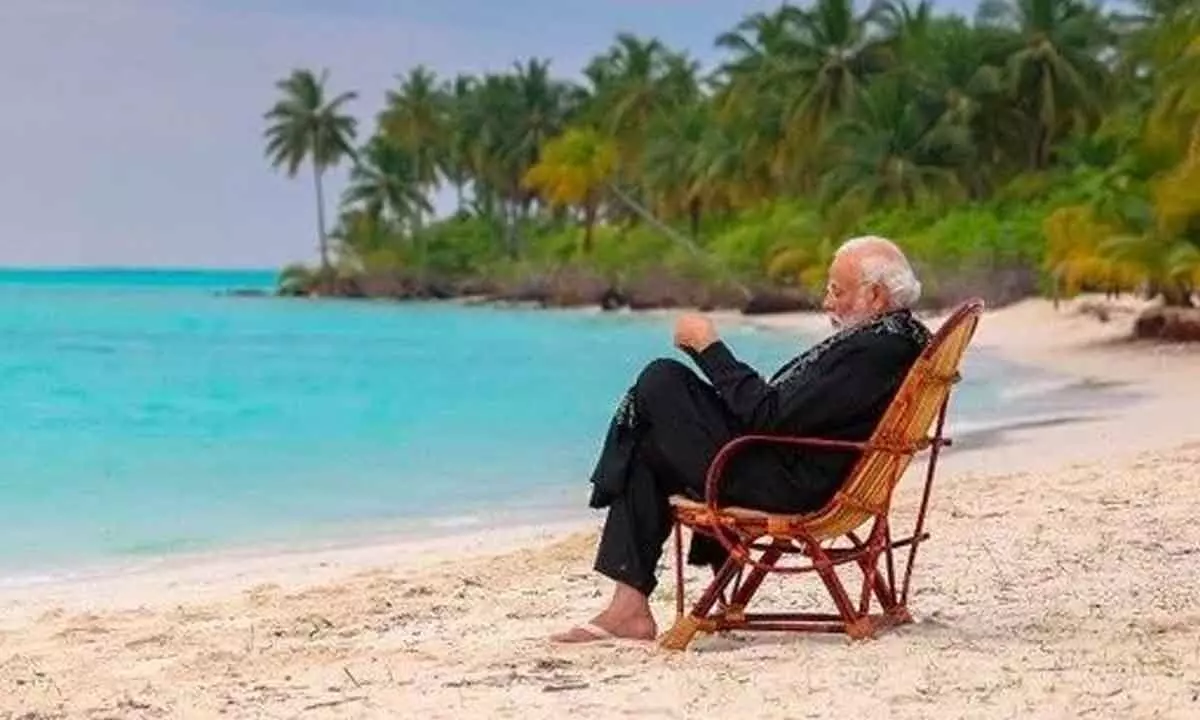What is the message behind commando mission on high seas?
As Bharat's global relevance expands, it will face challenges. Therefore, clarity in our diplomatic and military strategies becomes crucial to navigating these challenges effectively, and for that, it needs a decisive leader at the top
image for illustrative purpose

PM Modi's ‘solo photoshoot’ on the beaches of Lakshadweep might have been a meticulously planned diplomatic message to the island nation urging a reassessment of the bilateral relationship. And, my goodness, it not only conveyed the message but also triggered a diplomatic and economic tsunami
"Whoever controls the Indian Ocean will dominate Asia; the destiny of the world will be decided on its waters", - wrote P K Ghosh, a Senior Fellow at the Observer Research Foundation (ORF) India, in his piece for the East Asian Forum, the New Bharat is not letting any opportunity slip by to assert its rightful role as the watchdog of the Indian Ocean.
Last week, two developments in the Indian Ocean region helped Bharat communicate that it means business and will take necessary action to protect its national interest.
In a significant maritime operation, India swiftly responded to the threat posed by Somalian pirates by deploying its elite Marine commandos aboard the Indian Navy's missile destroyer, INS Chennai. Their mission was to rescue the MV Lila Norfolk, a Liberia-flagged bulk carrier that had fallen victim to the pirates, with 21 crew members, including 15 Indians, held captive. Though the operation didn't involve fireworks, as the pirates fled upon learning of the approaching forces, India's military action unequivocally conveyed its intentions - 'we will use force where and when necessary.'
Meanwhile, a notable incident that captured global attention involved Indian Prime Minister Narendra Modi's holiday in the picturesque island destination of Lakshadweep. This move was perceived by many as a diplomatic message directed towards the newly elected Maldives President Mohamed Muizzu, who, immediately after assuming office, vowed to remove Indian soldiers and shift from the country's India-centric policy.
PM Modi's ‘solo photoshoot’ on the beaches of Lakshadweep might have been a meticulously planned diplomatic message to the island nation urging a reassessment of the bilateral relationship. And, my goodness, it not only conveyed the message but also triggered a diplomatic and economic tsunami.
The fallout of PM Modi's PR exercise led to a disproportionate undiplomatic response when three Maldives parliamentarians made derogatory remarks against India and its Prime Minister Narendra Modi for holidaying in Lakshadweep. This led to a swift and widespread response from Indian celebrities and online communities calling for a boycott of the Maldives as a holiday destination. The "hashtag 'BoycottMaldives' gained momentum to become a top social media trend in India." According to travel agency reports, many cancellations in holiday bookings followed suit. Some news reports indicate that over "8,000 hotel bookings, as well as 2,500 flight tickets", were cancelled by Indian tourists following the incident. Annually, the islands receive over six lakhs of tourists, of whom the "largest number of tourists (2,09,198) are from India. Rajiv Mehra, president of the Indian Association of Tour Operators, noted that the full impact will be felt in the coming 20-25 days.
As tensions escalated, the three ministers, Malsha Shareef, Abdulla Mahzoom Majid, and Mariyam Shiuna, found themselves under mounting geopolitical and commercial pressure eventually, by evening, leading to their suspension by the government, but by then, the damage had been done.
In the complex landscape of geopolitics, prioritising national interests is crucial, leaving little margin for error. The recent incidents collectively convey a resolute message that the new Bharat is unhesitant in employing force as necessary and asserts its stance directly from the highest echelons of leadership. This readiness to act decisively and now when the need arises is a complete departure from old times when we as a nation would indulge in diplomatic ping-pong even when we were right and the aggrieved party.
As Ghosh comments in his article, "the Indian Ocean is a very 'active' ocean, perceived by many as the emerging centre of gravity in the strategic world", and Bharat is asserting its pivotal role, reaffirming the present and future status. In his book The India Way, S Jaishankar, India's foreign minister, notes, "New India is getting stronger by the day, and the world must come to terms with it."
Diverse assets strengthen today's Bharat, be it the large pool of skilled youth, expanding economic prowess, enduring democracy, a professional military, and a vibrant media. These elements empower it to engage with adversaries using multiple strategies, not just at its discretion.
As Bharat's global relevance expands, it will face challenges. Therefore, clarity in our diplomatic and military strategies becomes crucial to navigating these challenges effectively, and for that, it needs a decisive leader at the top.
(The author is Founder of My Startup TV)

